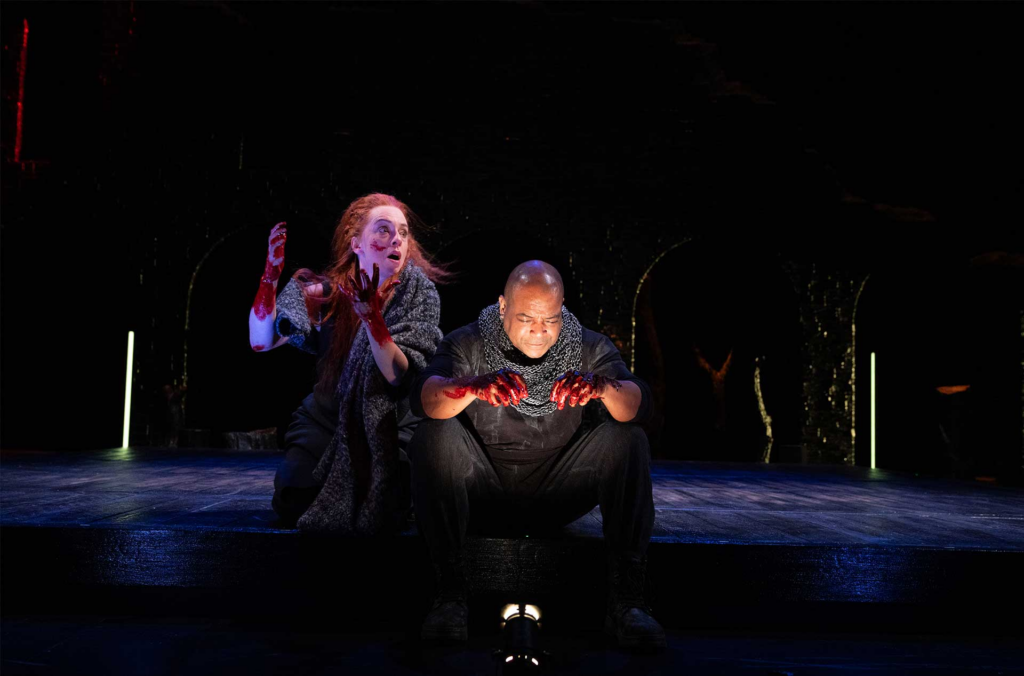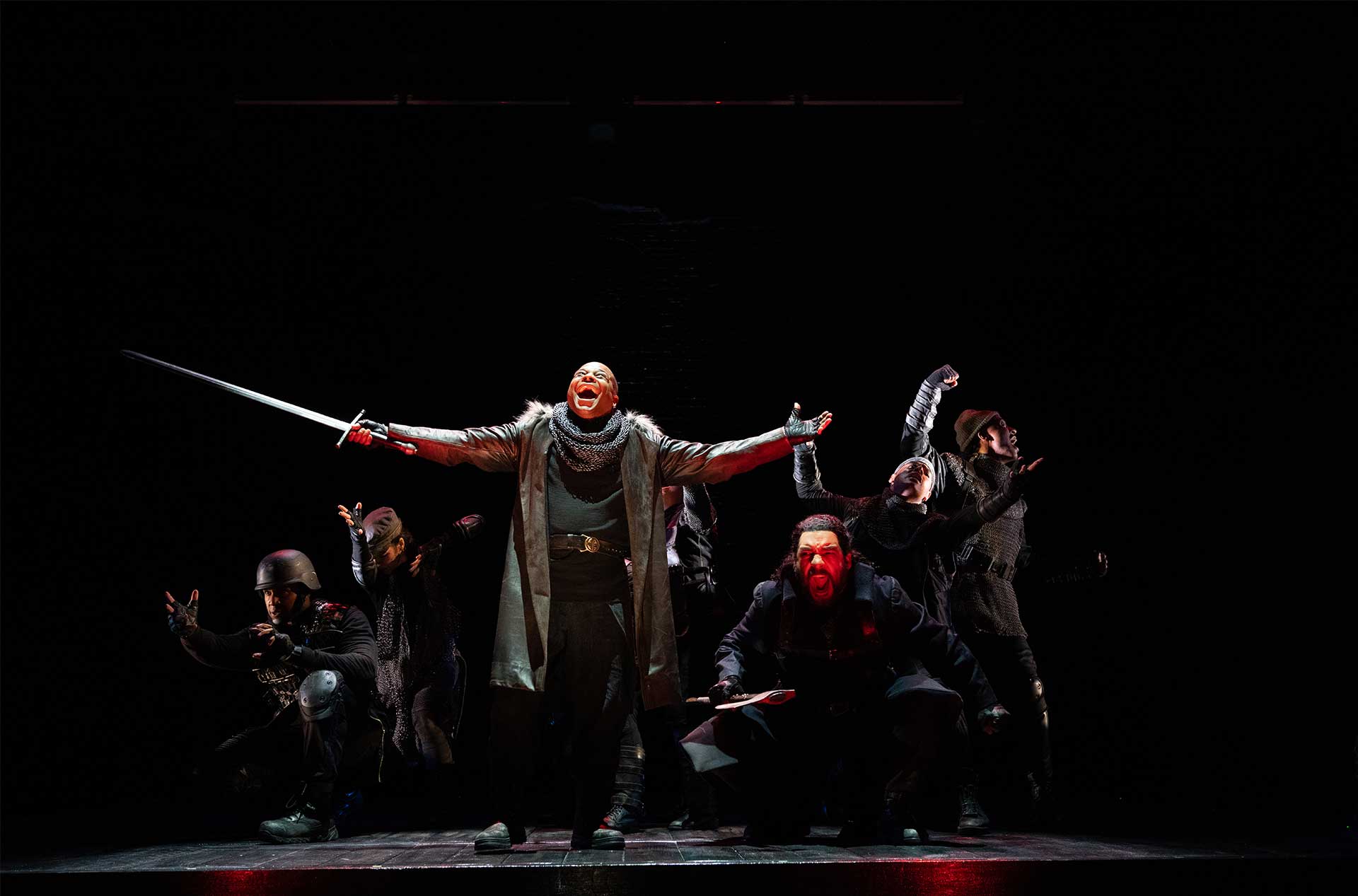Absolute power corrupts absolutely. Macbeth is in the theaters at Ashland’s own Oregon Shakespeare Festival. Southern Oregon University students are offered a generous ticket discount, two for thirty dollars. The play, the shortest of William Shakespeare’s tragedies and first shown in 1606, dramatically retells the rise and fall of the Scottish king Macbeth.
The play opens with Macbeth (played by Kevin Kenerly) and his loyal friend Banquo achieving a thunderous victory over the enemies of King Duncan (played by Jaysen Wright). However, Macbeth encounters three Witches (played by Kate Hurster, Amy Lizardo, and Jennie Greenberry), who hail him as King of Scotland. His appetite whetted, Macbeth and his wife Lady Macbeth (played by Erica Sullivan) take increasingly vicious measures to realize their ambitions. One of the play’s main themes is fate, as the Macbeths grapple with the implications of the portents that consume their lives.
From the beginning, the play sucks its viewers in with an outstanding opening sequence placed during and after Macbeth’s great victory, praising his virtues and martial prowess. Intense and cohesive, the play frequently makes use of song and dance to create the chilly, gothic castle air that Macbeth lives and breathes. Director Evren Odcikin’s interpretation is remarkably faithful to Shakespeare’s original language but is unafraid to make substitutions where the play can benefit from them– whether through the omission of King Duncan’s second son, Donalbain, or Lady Macbeth’s amusing shun of Prince Malcolm, the Oregon Shakespeare Festival brings the seventeenth century tragedy to life.

Macbeth holds a special place in the world of theater. It was sponsored and chartered by King James of England, who is allegedly descended from the character Banquo. Due to the notorious nature of the play’s protagonist, even uttering his name or his eponymous play’s was considered to be bad luck by some. Macbeth went by the epitaph “the Scottish Play”, while its lead character was given the sobriquets “the Thane”, “the King”, or simply “Mackers”. That hasn’t stopped generations of tragedians from bringing the play to countless audiences under every medium imaginable.
The Macbeths are a couple that, like Erica Sullivan’s Lady Macbeth says, were forged “in the dunnest smoke of hell”. First as Thane and later as King, Macbeth hides many things from many people. His smile in his opening scene is one of measured triumph. “I think not of them,” obliquely lies Macbeth about the three Witches. Lady Macbeth is similar, fainting when hearing news of the crimes she and her husband orchestrated. The secrets the Macbeths keep ultimately destroy them. One of Macbeth’s main themes, explored fascinatingly in the Shakespeare Festival’s adaptation, is the physical and psychological toll of the Macbeths’ quest for power.

One of the strongest parts of the play is observing the consequences of the Macbeths’ actions, whether in themselves or those around them. Their ambition carves a bloody path through the heart of Scotland. Whatever limits they started with rapidly disintegrates to bend to their will and desire. It is their undoing. “I cannot dig into the darkness that this play requires,” writes Director Evren Odcikin, “without a real commitment to ensemble.” Kevin Kenerly’s Macbeth closes the play screaming, at the Witches, his underlings, his own wife, and a host of apparitions the play never needs to explain that haunt him for his crimes. Lady Macbeth’s actions consume her just as thoroughly. In her first scene, with jaw-dropping vocals, she begs the spirits to make her cruel and hard enough to help Macbeth usurp Duncan; at the play’s close, she is desperately scrubbing the guilt out of her palms while completely asleep.
Unique among Shakespeare’s plays, Macbeth’s ending is a bittersweet one rather than strictly anguished kind that’s common with other works. This is another element the Oregon Shakespeare Festival excelled in communicating. The portents Macbeth scrambled to avoid became reality thanks to his own actions as he plunged his country into bloodshed and Civil War, uniting his many enemies against him like Birnam Wood to Dunsinane Hill. But the grisly downfall of Shakespeare’s tyrant only makes the harm the play portrays feel more authentic, and heightens Macbeth’s sense of helplessness in the face of uncaring fate.
Macbeth is available at the Oregon Shakespeare festival from March 19th to October 12th.
Photo credit: Oregon Shakespeare Festival
